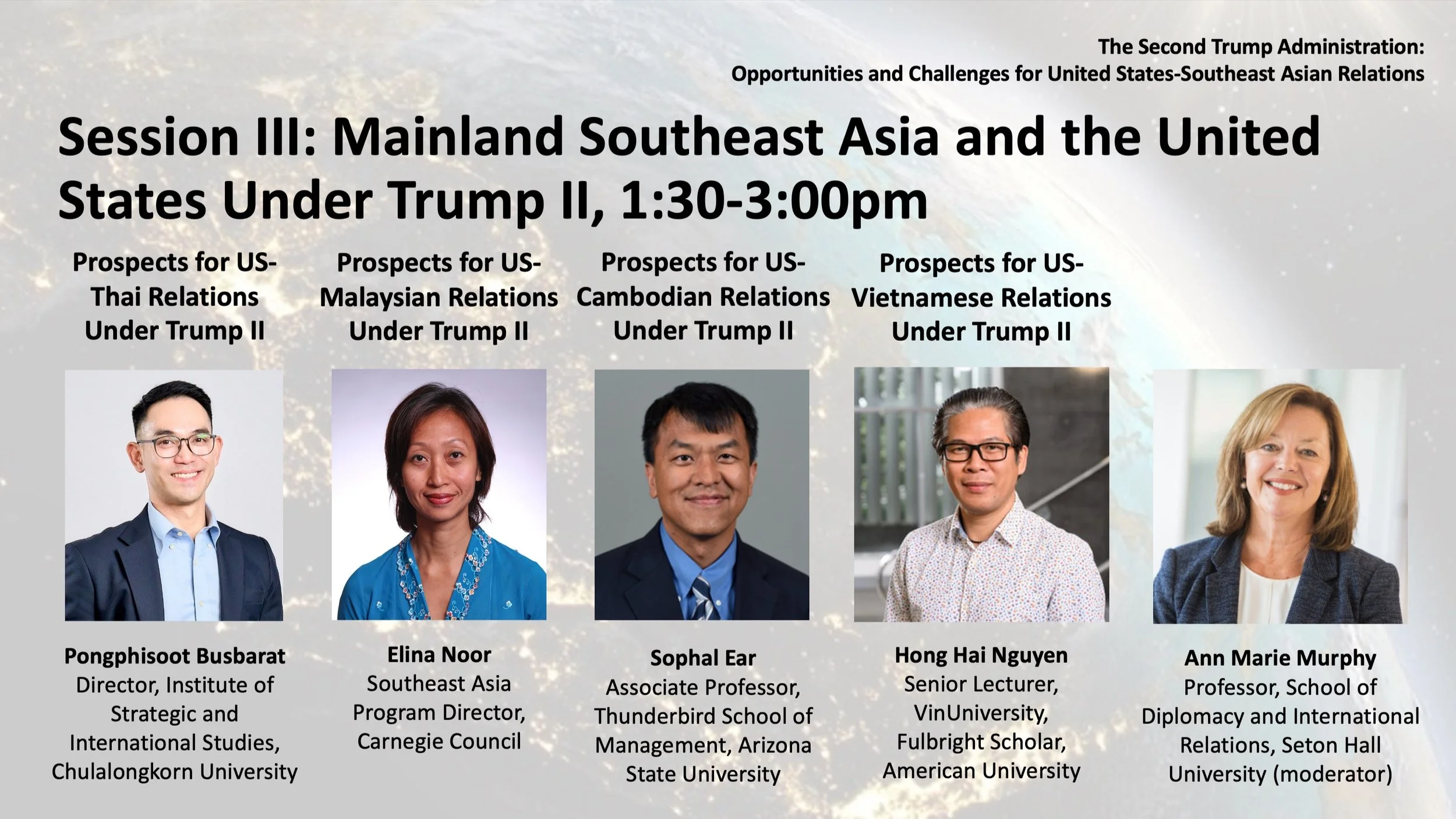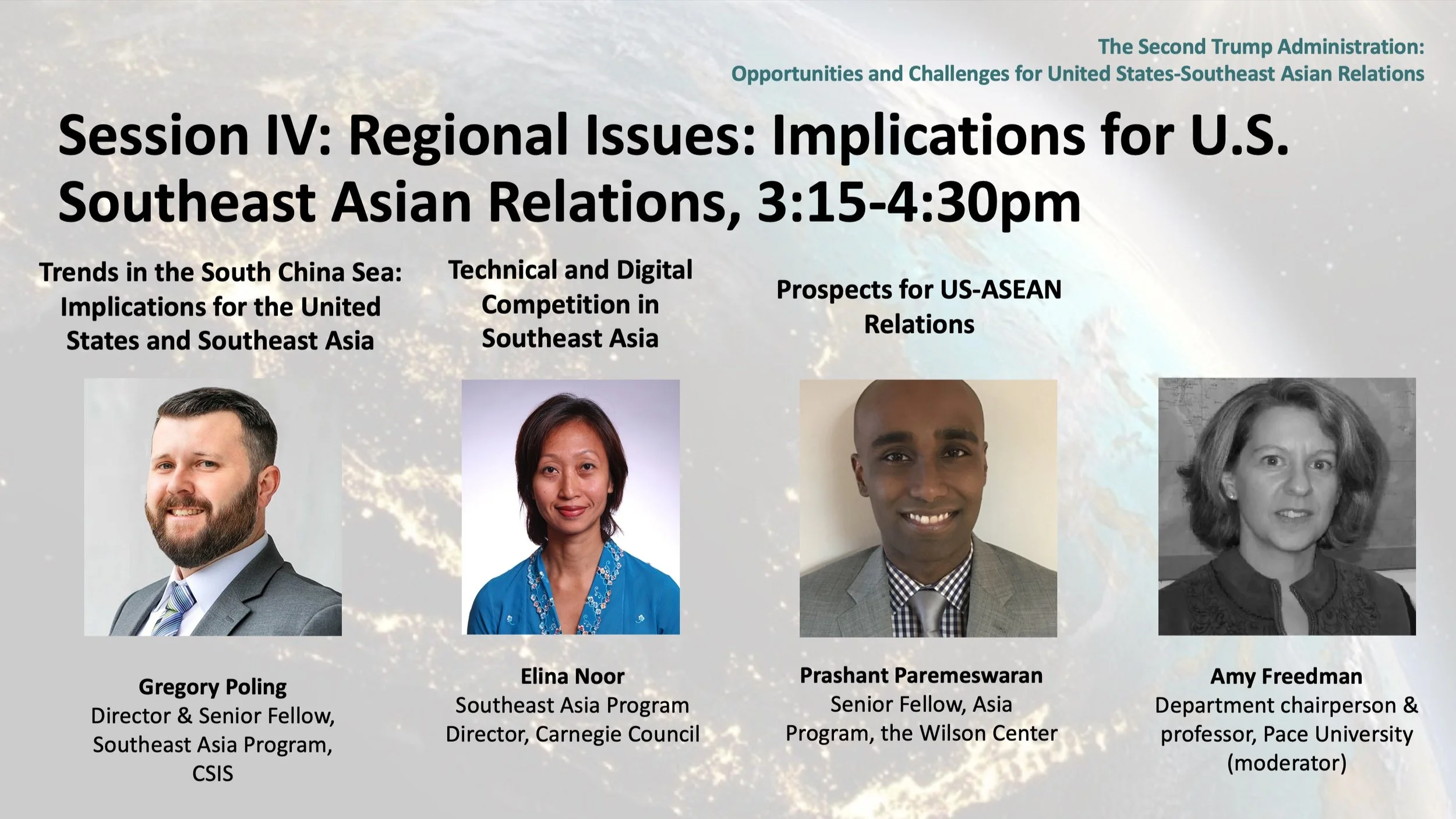[Recordings] The Second Trump Administration: Opportunities and Challenges for United States-Southeast Asian Relations
Recorded March 27, 2025
How will Southeast Asian states respond to Washington’s abandonment of the global order it has supported since WWII? A daylong conference offered multiple perspectives.
Co-hosted by the Weatherhead East Asian Institute and New York Southeast Asia Network
Co-sponsored by Columbia Journalism School and the China and the World Program
March 27, 2025 — In the aftermath of Donald Trump’s reelection, Southeast Asian states braced for a return to the transactional America First policy of his first administration. The United States promptly withdrew from global organizations and multilateral agreements such as the World Health Organization (WHO), the Paris Climate Agreement, and the Trans-Pacific Partnership while questioning the benefits of alliances like NATO and downgrading engagement with ASEAN. Washington also labeled China a peer competitor, launched a trade war, and adopted an Indo-Pacific policy that intensified pressure on Southeast Asian states to choose sides.
Given the first Trump administration’s coercive measures toward Southeast Asia, such as labeling Vietnam a currency manipulator, withdrawing GSP measures from Thailand, and threatening sanctions on Indonesia if it purchased Russian military equipment, Southeast Asian states expected the second Trump administration’s withdrawal from the WHO and Paris Agreement and its imposition of 10% tariffs on China. However, the breadth and depth of other measures that the Trump adopted after his January 20 inauguration sent shock waves through Southeast Asian capitals. The administration’s dismantling of USAID and freeze on virtually all foreign aid threatened programs throughout the region that traditionally generated goodwill toward Washington. Trump’s abandonment of Ukraine, rapprochement with Putin, and threats of 25% tariffs on all goods from Mexico and Canada stunned observers.
If the United States is willing to defy its Western allies and adopt such a coercive policy toward Canada, the largest U.S. market and a NATO ally, what does that portend for its more distant Southeast Asian partners? As China, Canada, and Mexico prepare to respond with retaliatory measures, what are the implications for the global trading order and its impact on Southeast Asia’s trade-dependent states? How do Southeast Asian states perceive Washington’s wholesale abandonment of the global order it has supported since WWII, and how will they respond? This conference addressed these and other questions and analyzed potential scenarios for the trajectory of U.S.-Southeast Asian relations under the second Trump administration.
Download the conference agenda (PDF)
Scroll down the page below for complete videos of four panel discussions and of the conference opening and closing remarks.
Featured speakers include Walden Bello, Pongphisoot Busbarat, Thomas Christensen, Sophal Ear, Joseph Chinyong Liow, Derek Mitchell, Ann Marie Murphy, Hong Hai Nguyen, Lien-Hang Nguyen, Elina Noor, Praslhant Parameswaran, Gregory Poling, Yohanes Sulaiman, and Ayumi Teraoka. These leading experts examine the implications of a second Trump administration for US-Southeast Asian relations at this critical junction in global politics.
WELCOME REMARKS
Speakers:
Lien-Hang T. Nguyen, Dorothy Borg Chair in the History of the United States and East Asia; Director, Weatherhead East Asian Institute, Columbia University
Ann Marie Murphy, Professor, Seton Hall University, Adjunct Senior Research Scholar, Weatherhead East Asian Institute, Columbia University
PANEL I: SETTING THE CONTEXT: GEOSTRATEGIC COMPETITION IN THE INDO-PACIFIC
Speakers:
“U.S. Policy Toward Southeast Asia: The View from Washington”
Derek Mitchell, former U.S. Ambassador to Myanmar (Burma) (2012-2016); Senior Advisor (non-resident), Asia Program & Executive Office, Center for Strategic and International Studies (CSIS), Office of the President
“Prospects for U.S.-China Relations Under Trump II: Implications for Southeast Asia”
Thomas Christensen, James T. Shotwell Professor of International Relations, Columbia University
“Prospects for U.S.-Japan Relations Under Trump II: Implications for Southeast Asia”
Ayumi Teraoka, Postdoctoral Fellow, Weatherhead East Asian Institute, Columbia University
Moderator:
Ann Marie Murphy, Professor, Seton Hall University, Adjunct Senior Research Scholar, Weatherhead East Asian Institute, Columbia University
PANEL II: MARITIME SOUTHEAST ASIA AND THE UNITED STATES UNDER TRUMP II
Speakers:
“Prospects for U.S.-Singapore Relations under Trump II”
Joseph Chinyong Liow, Dean of College of Humanities, Arts, and Social Sciences, Nanyang Technological University
“Prospects for U.S.-Philippines Relations under Trump II: The View from Washington”
Gregory B. Poling, Director & Senior Fellow, Southeast Asia Program and Asia Maritime Transparency Initiative, Center for Strategic and International Studies (CSIS)
“Prospects for U.S.-Philippines Relations under Trump II: The View from Manilla”
Walden Bello, Philippines academic; human rights activist; former Philippine Congressman
“Prospects for U.S.-Indonesian Relations under Trump II”
Yohanes Sulaiman, Associate Professor, Universitas Jenderal Achmad Yani
Moderator:
John Gershman, Clinical Professor of Public Service; Director, International Specialization and International Capstone Programs, Wagner School of Public Service, New York University
PANEL III: MAINLAND SOUTHEAST ASIA AND THE UNITED STATES UNDER TRUMP II
Speakers:
“Prospects for U.S.–Thai Relations Under Trump II”
Pongphisoot Busbarat, Assistant Dean & Professor of International Relations, Faculty of Political Science, Chulalongkorn University; Director, Institute of Strategic and International Studies (ISIS Thailand); Former Dorothy Borg Postdoctoral Fellow in Southeast Asian Studies
“Prospects for U.S.–Malaysian Relations Under Trump II”
Elina Noor, Senior Fellow, Asia Program, Carnegie Endowment for International Peace (via Zoom)
“Prospects for U.S.–Cambodian Relations Under Trump II”
Sophal Ear, Associate Professor, Thunderbird School of Global Management, Arizona State University; President, International Public Management Network (IPMN)
“Prospects for U.S.–Vietnamese Relations Under Trump II”
Hong Hai Nguyen, Senior Lecturer, VinUniversity, Fulbright Scholar, American University
Moderator:
Ann Marie Murphy, Professor, Seton Hall University, Adjunct Senior Research Scholar, Weatherhead East Asian Institute, Columbia University
PANEL IV: REGIONAL ISSUES: IMPLICATIONS FOR U.S.-SOUTHEAST ASIAN RELATIONS
Speakers:
“Trends in the South China Sea: Implications for the United States and Southeast Asia”
Gregory B. Poling, Director & Senior Fellow, Southeast Asia Program and Asia Maritime Transparency Initiative, Center for Strategic and International Studies (CSIS)
“Technical and Digital Competition in Southeast Asia”
Elina Noor, Senior Fellow, Asia Program, Carnegie Endowment for International Peace (via Zoom)
“Prospects for U.S.-ASEAN Relations”
Prashanth Parameswaran, Senior Fellow, Asia Program, the Wilson Center; CEO & Founder, ASEAN Wonk Global; Senior Columnist, The Diplomat (via Zoom)
Moderator:
Amy Freedman, Department Chairperson & Professor, Political Science, Dyson College of Arts & Sciences, Pace University
CONCLUDING REMARKS
Speakers:
Derek Mitchell, Former U.S. Ambassador to Myanmar (Burma) (2012-2016); Senior Advisor (non-resident), Asia Program & Executive Office, Center for Strategic and International Studies (CSIS), Office of the President
Joseph Chinyong Liow, Dean of College of Humanities, Arts, and Social Sciences, Nanyang Technological University
Ann Marie Murphy, Professor, Seton Hall University, Adjunct Senior Research Scholar, Weatherhead East Asian Institute, Columbia University





